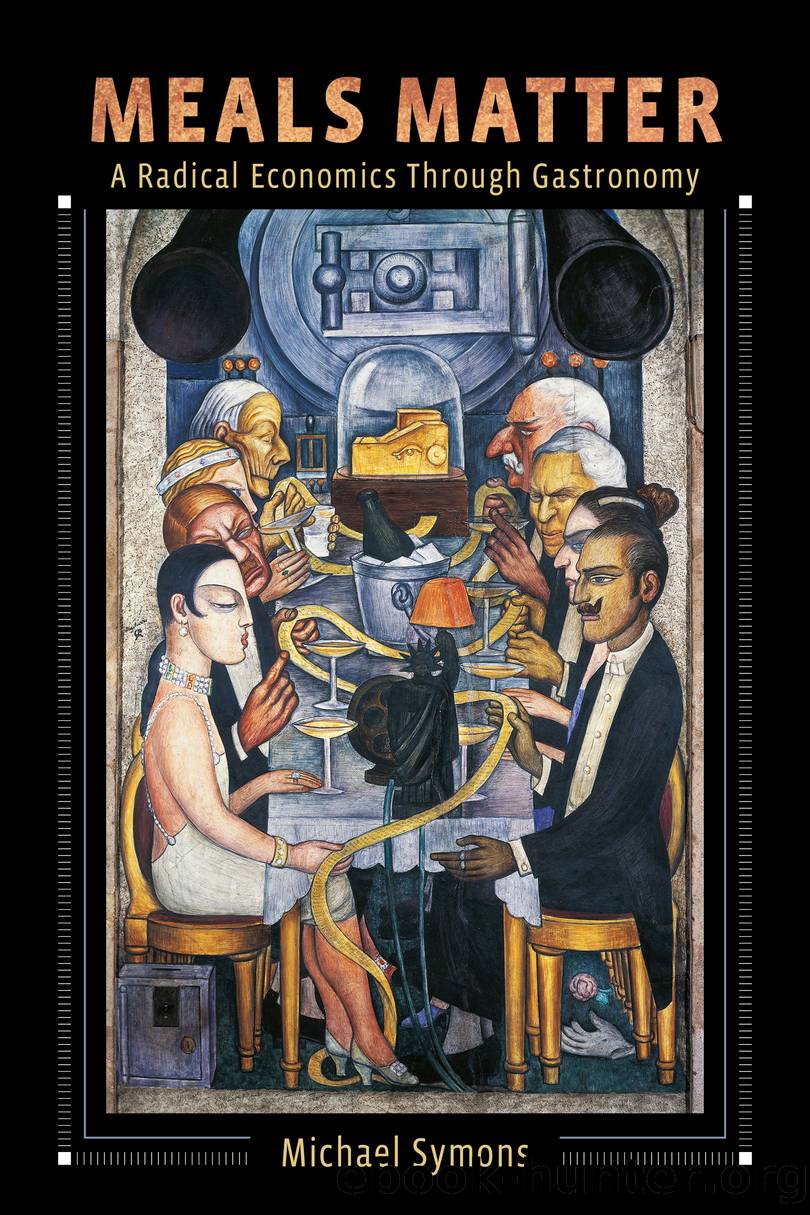Meals Matter by Michael Symons

Author:Michael Symons
Language: eng
Format: epub
Publisher: Columbia University Press
Capitalism, or Else
One of Mises’s favorite techniques was to pose a stark choice—the alternatives were “apodictic and absolute” (1966, 196). The two options amounted to the price mechanism or total planning, to capitalism or war, to siding with money or being a soft-hearted, envious dupe. Mises then chose capitalism, and, since the world is complex, this required inconsistency. At one point, greed was a human universal: “Whereas in a capitalist society selfishness incites everyone to the utmost diligence, in a socialist society it makes for inertia and laxity” (677). Elsewhere, a committed communist bureaucrat might actually work hard to “court the favor of those in power” (274).
Little matched his hypocrisy about the state. He dismissed democracy and welfare and overlooked corporate reliance on government for planning, infrastructure, regulation, subsidies, correcting externalities, outsourcing, and so on. Instead, “considerable” taxes for the “government apparatus of courts, police officers, prisons, and of armed forces” were “fully compatible with the freedom the individual enjoys in a free market economy” (282).
In 1920 Mises set out the Austrian school’s often-quoted claim that a socialist commonwealth was unachievable because of the “economic calculation problem,” that is, the world’s complexity made central direction of “rational economic activity” impossible (1935, 130). As quoted earlier, Adam Smith (Wealth, 2.4.9) said sovereigns lacked the wisdom and knowledge to superintend the lives of ordinary people. Economics professor Max Weber (1968, 103) found a “planned economy” impossible unless some non-Market way were found to ascribe value. When “self-styled welfare economists” ignored complexity, Mises (1966, 834) suggested, they were trying to hide their “fallacies” behind a word (welfare) that might “disarm all opponents.” Society’s complicated task could be entrusted only to his alternative. Money did “all that we are entitled to ask of it—a guide amid the bewildering throng of economic possibilities” (1981, 100–1).
Mises toughed out internal contradictions for his own combative reasons. But why am I bothering? Not only have Mises’s ideas permeated recent thinking, but he pursued the antigastronomic ideals of neoclassical economics to the bitter end. In deploying key arguments, Mises demonstrated that economics had adapted to, and then advocated, corporate logic. Not that Mises accepted the existence of corporations.
Throughout, Mises remained committed to individual liberty. “Since time immemorial in the realm of Western civilization liberty has been considered as the most precious good.…‘Rugged’ individualism is the signature of our civilization” (1966, 284). This was no everyday individual, however—not marked by dignity, wisdom, compassion, nor that most self-centered of attributes, a healthy appetite.
Download
This site does not store any files on its server. We only index and link to content provided by other sites. Please contact the content providers to delete copyright contents if any and email us, we'll remove relevant links or contents immediately.
International Integration of the Brazilian Economy by Elias C. Grivoyannis(111064)
The Radium Girls by Kate Moore(12033)
Turbulence by E. J. Noyes(8055)
Nudge - Improving Decisions about Health, Wealth, and Happiness by Thaler Sunstein(7711)
The Black Swan by Nassim Nicholas Taleb(7135)
Rich Dad Poor Dad by Robert T. Kiyosaki(6642)
Pioneering Portfolio Management by David F. Swensen(6303)
Man-made Catastrophes and Risk Information Concealment by Dmitry Chernov & Didier Sornette(6022)
Zero to One by Peter Thiel(5805)
Secrecy World by Jake Bernstein(4755)
Millionaire: The Philanderer, Gambler, and Duelist Who Invented Modern Finance by Janet Gleeson(4481)
The Age of Surveillance Capitalism by Shoshana Zuboff(4301)
Skin in the Game by Nassim Nicholas Taleb(4253)
The Money Culture by Michael Lewis(4211)
Bullshit Jobs by David Graeber(4195)
Skin in the Game: Hidden Asymmetries in Daily Life by Nassim Nicholas Taleb(4009)
The Dhandho Investor by Mohnish Pabrai(3770)
The Wisdom of Finance by Mihir Desai(3751)
Blockchain Basics by Daniel Drescher(3585)
